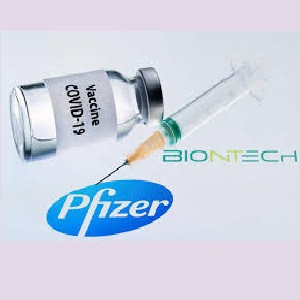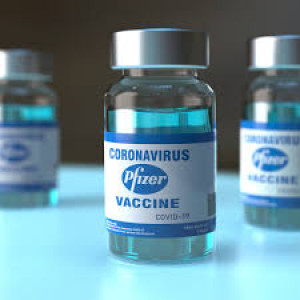| Pfizer Inc |


| Registration Date | 28 Feb 2021 |
| Revision Date | 28 Feb 2021 |
| Share |
Medicine Pharmaceuticals
COVID-19 vaccine
The Pfizer-BioNTech COVID-19 vaccine was sent to the FDA for possible Emergency Use Authorization (EUA) on Friday, November 20 and authorized on December 11. It is an mRNA vaccine that codes for the virus’s spike protein and is encapsulated in a lipid nanoparticle. Once injected, the cells churn out the spike protein, triggering the body’s immune system to recognize the virus. In Phase III trials, it demonstrated 95% efficacy. The Pfizer-BioNTech vaccine requires storage at about -94 degrees F, which requires specialized freezers. The Pfizer-BioNTech COVID-19 Vaccine is a vaccine and may prevent you from getting COVID-19. There is no U.S. Food and Drug Administration (FDA) approved vaccine to prevent COVID-19.
The Pfizer-BioNTech COVID-19 Vaccine is administered as a 2-dose series, 3 weeks apart, into the muscle.
The FDA has authorized the emergency use of the Pfizer-BioNTech COVID-19 Vaccine to prevent COVID-19 in individuals 16 years of age and older under an Emergency Use Authorization (EUA).
The Pfizer-BioNTech COVID-19 Vaccine includes the following ingredients: mRNA, lipids ((4-hydroxybutyl)azanediyl)bis(hexane-6,1-diyl)bis(2-hexyldecanoate), 2 [(polyethylene glycol)-2000]-N,N-ditetradecylacetamide, 1,2-Distearoyl-sn-glycero-3-phosphocholine, and cholesterol), potassium chloride, monobasic potassium phosphate, sodium chloride, dibasic sodium phosphate dihydrate, and sucrose.
In an ongoing clinical trial, the Pfizer-BioNTech COVID-19 Vaccine has been shown to prevent COVID-19 following 2 doses given 3 weeks apart. The duration of protection against COVID-19 is currently unknown.
Side effects that have been reported with the Pfizer-BioNTech COVID-19 Vaccine include:
· injection site pain
· tiredness
· headache
· muscle pain
· chills
· joint pain
· fever
· injection site swelling
· injection site redness
· nausea
· feeling unwell
· swollen lymph nodes (lymphadenopathy)
· non-severe allergic reactions such as rash, itching, hives, or swelling of the face
· severe allergic reactions
Vaccine candidate was found to be more than 90% effective in preventing COVID-19 in participants without evidence of prior SARS-CoV-2 infection in the first interim efficacy analysis
Analysis evaluated 94 confirmed cases of COVID-19 in trial participants
Study enrolled 43,538 participants, with 42% having diverse backgrounds, and no serious safety concerns have been observed; Safety and additional efficacy data continue to be collected
Submission for Emergency Use Authorization (EUA) to the U.S. Food and Drug Administration (FDA) planned for soon after the required safety milestone is achieved, which is currently expected to occur in the third week of November
Clinical trial to continue through to final analysis at 164 confirmed cases in order to collect further data and characterize the vaccine candidate’s performance against other study endpoints